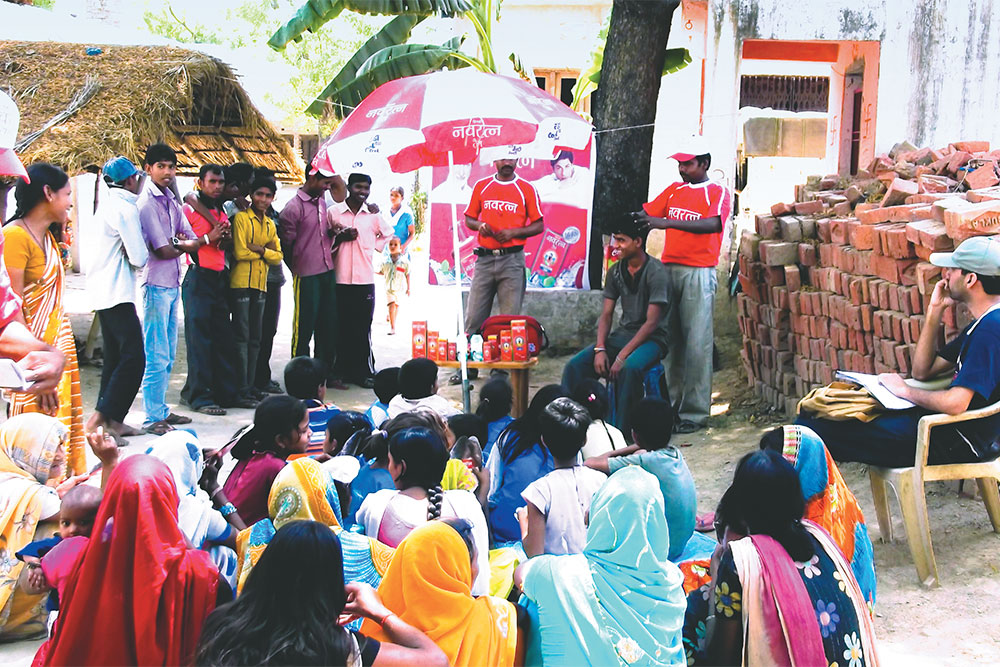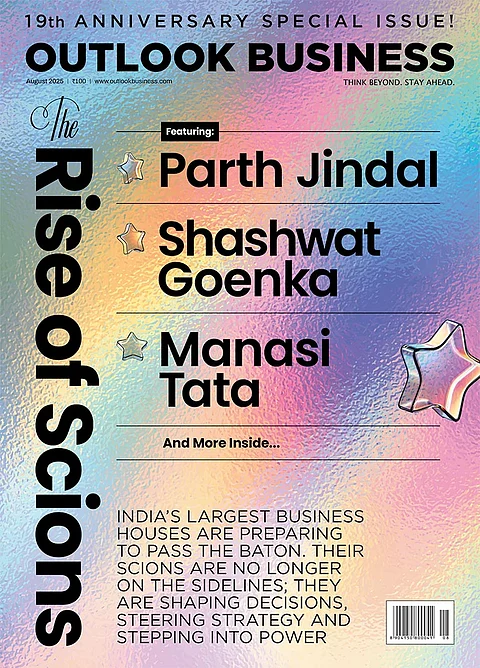In the summer of 2010, out on a stroll in the grassy meadows of a village on the outskirts of Kolkata, all that 36-year-old Mohan Goenka, director of leading FMCG brand Emami limited, could see around him were narrow roads branching off in different directions, snaking past paddy fields to connect village homes with the bustling main road.
Trucks stuffed with poultry and carbonated drinks alike trundled down this road, with tempos, buses and other city vehicles for company. The dimly-lit retail stores offering an eclectic mix of products with equally enthusiastic shopkeepers. Goenka realised that this far-from-pastoral scene perhaps had more space and sales opportunities to offer his company than most big cities and convinced Emami’s senior management about venturing deep into the hinterland. Thus was born Project Swadesh, an initiative with the express intention of improving the company’s existing coverage of rural markets.
“We catered to the masses anyway, so we thought that this would be a good strategic decision. In 2010, at the time of the launch of the programme, the contribution of rural markets to overall sales volumes was approximately 17%. This figure has now risen to almost 45-50%,” says Goenka.
A rise in sales volumes was just one of the outcomes Emami was betting on while undertaking its risky rural sojourn — with this outreach programme of sorts, the company was also hoping to grab the untapped potential of rural markets. Using tried and tested methods such as extending rural distribution through the super-stockist and sub-stockist models, increasing coverage using van operations and reducing dependence on wholesale or indirect distribution of its products, Emami slowly built its presence in rural markets.
In its first year, the project was rolled out in Uttar Pradesh, erstwhile Andhra Pradesh, Madhya Pradesh, Bihar, Maharashtra, Rajasthan and West Bengal, which together account for 55% of the total population of India. Later, the project was extended to Tamil Nadu, Odisha, Haryana, Punjab and Gujarat.
Independent field forces were also deployed in phases for the execution and close monitoring of the programme. This is probably why the reported direct outlet coverage of the brand went from around 4 lakh in 2010 to 6.34 lakh in FY14, with an indirect reach of 3.4 million retailers. “We used Emami’s vast mass products basket, which includes low-priced cooling oils, creams, talcum powder, balm and lotions, to aid our rural strategy,” Goenka adds.
Its vibrant product basket is also what sets apart the Kolkata-headquartered company from its well-entrenched competitors. Set up in the 1970s by RS Agarwal and RS Goenka with a seed capital of ₹20,000, Emami today operates out of the Eastern Metropolitan Bypass in Kolkata. Thanks to its inventive rural strategy, the company has been able to directly connect to hundreds of 10,000-people-strong villages.
On a sunny October afternoon, as Emami’s HQ is abuzz with the lunch-hour rush, Harsha Vardhan Agarwal, the 37-year-old director of the company and the younger son of founder and executive chairman RS Agarwal, seems more than eager to share insights into the rural blitzkrieg. “Our strategy is simple — sustainable sales success combined with a wide footprint. We are now delivering new products to stores quickly.”
The company is also backing up its rural reach with an equally aggressive product pricing strategy. Agarwal picks up a sachet from the dizzying array of cosmetics around the room and carefully places it on a table. “This packet of our well-known brand Navratna Cool oil is priced at just ₹1. Pricing is proving to be key for us, as it has helped us capture unaddressed markets. Thanks to the efforts of our distribution network, sachet sales now account for 29% of Navratna’s overall revenue,” he quips.
Maker of brands such as Boroplus, Fair and Handsome and Zandu Balm, Emami has withstood the test of time, altering its offerings in step with the rapidly changing demographics of its hometown. The company is now redefining its identity, refurbishing operations and restructuring its workforce to give itself a much-needed upgrade and make itself more relevant to a price- and variety-conscious population.
Hinterland hopes
With India’s FMCG sector expected to grow at a CAGR of 14.7% to $110 billion by 2020, Emami has been on the lookout for segments to power future growth, before finally zeroing in on a plan to enhance penetration in rural and urban India. While it hopes to capitalise on urban growth to make its products more accessible to customers, the company is keen on a strong rural distribution network that gives it direct access to retailers in villages.
Emami plans to launch several profitable product extensions to build on this growth, with brands such as Zandu Vigorex, Emami 7 Oils in One, Boroplus Face Wash and Fair and Handsome Face Wash for men being launched in the last year alone. But at the heart of all these plans is one simple, compelling success story — a strong distribution network, both direct and indirect.
And Project Swadesh perhaps deserves credit as Emami’s biggest distribution success in recent years, with the company coming up with novel ways to push its products in the rural sphere. “Events such as village fairs and yatras, where people gather in huge numbers for a common cause, offer us a great opportunity to connect with our target audience,” says Agarwal.
Which is why an integral part of Emami’s rural marketing strategy was brand-related activities at popular melas and fairs, such as the Sonepur mela, Sawan mela, Kanlinga yatra and the Kumbh mela. “The below-the-line activities undertaken at these melas and haats helped us create a strong brand presence, in turn helping us improve rural penetration and awareness,” he adds. The company’s enhanced presence in modern trade also helped it consolidate its urban and rural reach and ensured direct access to consumers. “We conducted various trade meets to enhance engagements with trade partners and implemented IT initiatives at the dealer level, improving secondary sales visibility,” says Naresh Bhansali, CEO, finance, strategy and business development, Emami.
Emami also increased the implementation of its distributor billing software to around 1,000 distributors. “While the basic structure of our FMCG distribution system is similar to our peers, the difference lies in the execution, in which Emami excels,” says Agarwal. He explains that Emami’s sales team is building capability to drive sales efficiency, improve in-store and in-market impact and build information systems.
According to its management, the company has invested considerably in manpower — both direct and indirect — over the past two years to spearhead the distribution mechanism. In the consumer care division alone, direct manpower deployment has increased by more than 10% over the past two years and the increase in indirect manpower is projected to grow by more than 25% by 2014-15. An exclusive rural sales team featuring everyone from managers to front-liners has also been deployed to ensure exclusive focus on rural distribution.
Besides these measures, there has also been an increased emphasis on improving visibility and ensuring focused execution, resulting in increased direct outlet coverage by 64,000 outlets in FY14. Sales growth during this period was nearly 17% on a five-year CAGR basis.
The company also plans to create a strong network of viable distributors and a highly motivated sales team with a hunger to achieve bigger targets, using modern trade as a growth engine to project its product range and information systems and technology to drive efficiency. Plans are afoot to extend Project Swadesh to Gujarat, Punjab, Haryana, Tamil Nadu and Odisha in the second phase and improve distribution and range further in existing rural markets. According to Agarwal, the company plans to increase direct sales by 15-20% every year and invest significantly in IT systems for the overall distribution system.
Small is beautiful
Emami’s key to increased penetration in the rural markets lies in its low-priced packs in the mass category. “Emami is leveraging its low-unit pack portfolio to drive penetration of its products in rural and semi-urban areas. Nearly 30% of its turnover currently comes from stock-keeping units (SKUs) priced below ₹5,” says a Mumbai-based analyst on condition of anonymity.
The company currently offers ₹2 SKUs of Zandu Balm and Mentho Plus, ₹1 sachets of Navratna oil (which accounts for 40% of brand sales), ₹10 SKUs of Fair and Handsome and ₹5 SKUs of Vasocare petroleum jelly and Boroplus in order to drive penetration and usage in rural markets. Going forward, Emami aspires to improve the outlet coverage by adding new outlets in urban markets as well. Newer launches such as HE deodorant and She Comfort — sanitary pads — have given the brand access to new stores as well. It’s not just reaching out to retailers in the hinterland that Emami is banking on for growth, consumer feedback is a big takeaway.
“Insights gathered from our visits to rural market led to our foray into cooling talcum powder. For villagers only fragrance was not enough of an attribute. Increasingly, they were in need of something which kept their body cool in extreme summer. That’s how our development team created the Navratna Cool Talc. For us, Project Swadesh is also an important feedback mechanism,” points out Goenka.
Today, Emami’s distribution pipeline comprises of more than 3,000 distributors and 6,450 sub-distributors, and the company covers the entire country through its 28 depots. “This pipeline makes it possible for Emami to distribute its products wider, quicker and at an efficient cost to retail shelves,” says Agarwal. While Uttar Pradesh, Bihar, Jharkhand, Seemandhra, West Bengal, Maharashtra and Madhya Pradesh are among the most prominent rural markets for Emami, Navratna oil and Boroplus are the products that are most popular.
“Zandu Balm and Mentho Plus also see high rural sales in states such as Seemandhra and Maharashtra,” says Goenka. Apart from popular brands such as Navratna, Boroplus, Zandu Balm and Mentho Plus, the company has also seen traction in other products such as Fair and Handsome and Vasocare in rural markets over the past few years, he adds. Large distributors, too, are upbeat about the change in strategy. “The coverage of Emami products has improved significantly — contribution of all SKUs increased; contribution of retail sales increased to 70% from 50% earlier, while wholesale has come down to 30% from 40%,” says Umang Jain of Delhi-based Arihant Enterprises, which supplies to 41 wholesalers and 1170 retailers around east Delhi.
While propping up its distribution strategy, the company has also ensured that its advertising and promotion (A&P) strategy remains as aggressive as ever. “Though the advertising and promotion (A&P) to sales ratio has declined over the past four years, at over 16%, it is still one of the highest among its FMCG peers, which have largely maintained sub-15% A&P-to-sales ratios. The company’s advertisement campaigns are in keeping with its mass market focus,” says a Motilal Oswal research report.
Industry experts believe that Emami also has a long roster of celebrities endorsing its brands and that makes a big difference, especially in rural households. HK Press, an independent consumer consultant and former vice-chairman of Godrej Consumer Products, says, “Emami has an interesting assortment of products and the company keeps innovating on the same, roping in celebrities to appeal to the vast section of the population it is targeting.” Celebrities from diverse fields — from Amitabh Bachchan, Madhuri Dixit and Hrithik Roshan to Milkha Singh and Gautam Gambhir to name a few — endorse the brand’s products on-air.
“The celebrity appeal creates aspirational values and widens the intended target audience group for our niche products,” feels Agarwal. Given that its next push for growth is decidedly rural, Emami seems to have got its script right.












 Just one email a week
Just one email a week